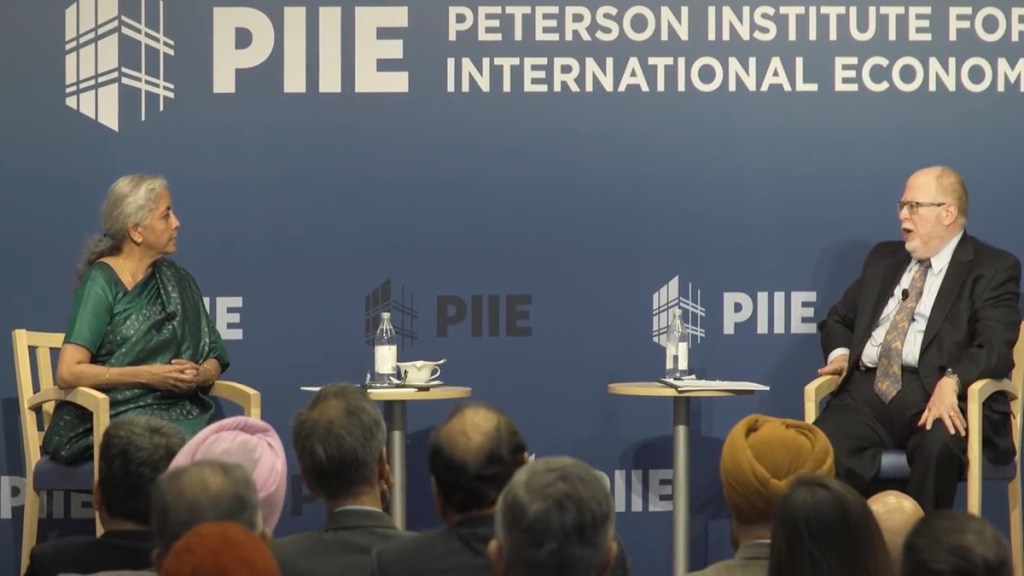Asking businesses to look at diversifying their supply chains beyond China, finance minister Nirmala Sitharaman on Tuesday said Covid-induced disruptions in the global supply chain indeed justified such a strategy. India would be the best bet for global firms in this endeavour, given its young population and skill sets.
She also stressed the need for the World Trade Organisation (WTO) to be more open about issues, while reiterating that India would continue to use the bilateral free trade agreements (FTAs) route to bolster its trade.
Also Read: Centre relaxes wheat procurement norms in Punjab, Haryana, Chandigarh and Rajasthan
“We need value chains come to India and produce in India, not just for India, but to export from India. We have come up with a production-linked incentive schemes, in 13 areas, which are priority, sunrise sectors, where India didn’t produce at all earlier,” Sitharaman said at the Peterson Institute for International Economics Washington DC on the sidelines of the World Bank-IMF spring meetings.
Besides meeting domestic demand, India hopes to have production of many of these large bulk manufactured goods and export them.
“But, at the same time, we need to get your raw materials and intermediaries which otherwise we do not have. So, it’s not as if we’re going to be so blindfolded that (we think) we’ll just take a decision and it’ll have no impact whatsoever outside,” she said.
“However, I don’t think India’s alone is doing this, particularly after the global view of China post the pandemic, after also this changing perspective of what indeed is globalisation, how far globalisation, to what extent globalisation? So, when all these questions are happening and being discussed all over the world, India cannot be in isolation,” Sitharaman said.
The minister said she would still think there would be a lot of investment interest and manufacturing interest going back to China or restoring themselves in China after removal of Covid restrictions. Besides India, other countries like Vietnam and Indonesia are also pitching for to be part of global value chains for companies diversifying their manufacturing base.
On the WTO, Sitharaman said it needs to give more space to the countries which have something different to say. “WTO should be more open about issues. WTO has to be progressive and fair to all members. It has to give voice to all and not just hear but also heed,” she said.
Also Read: India will use G20 narrative to push its digital transformation story to world, says Amitabh Kant
India’s initiative to pursue FTAs with countries is working out well, she said in response to a question. “We have just concluded one with Australia. We’ve concluded earlier, one with the UAE and Mauritius…So, we shall proceed in that route,” she said. “Also with the United Kingdom, the European Union and Canada (talks) are happening now as we speak, the negotiations are going on.”
Responding to questions about Muslim population in India, Sitharaman said: “India has the second-largest Muslim population in the world, and the population is only growing in numbers. If there is a perception, or if there’s in reality, their lives are difficult or made difficult with the support of the state, which is what is implied in most of these write-ups, I would ask, will this happen in India in the sense, will the Muslim population be growing than what it was in 1947?”
Speaking about India’s G20 presidency, she said India aims to develop a common framework for all countries to deal with risks associated with cryptocurrencies. “Cryptocurrencies are a very important part of the discussion under the #G20India presidency, given so many collapses and shocks in cryptocurrencies. We seek to develop a common framework for all countries to deal with this matter,” she said.
